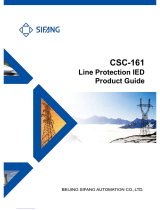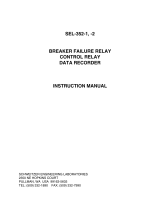
7.6.2 Application.........................................................................................................................................155
7.6.3 Setting guidelines............................................................................................................................ 156
7.7 Thermal overload protection, one time constant Fahrenheit/Celsius LFPTTR/
LCPTTR (26)........................................................................................................................................... 164
7.7.1 Identification.....................................................................................................................................164
7.7.2 Application........................................................................................................................................ 164
7.7.3 Setting guideline.............................................................................................................................. 165
7.8 Thermal overload protection, two time constants TRPTTR (49)................................................ 165
7.8.1 Identification.....................................................................................................................................166
7.8.2 Application........................................................................................................................................ 166
7.8.3 Setting guideline.............................................................................................................................. 167
7.9 Breaker failure protection CCRBRF(50BF).......................................................................................169
7.9.1 Identification.....................................................................................................................................169
7.9.2 Application........................................................................................................................................ 169
7.9.3 Setting guidelines............................................................................................................................ 169
7.10 Breaker failure protection, single phase version CCSRBRF (50BF).............................................173
7.10.1 Identification..................................................................................................................................... 173
7.10.2 Application.........................................................................................................................................173
7.10.3 Setting guidelines.............................................................................................................................173
7.11 Stub protection STBPTOC (50STB)................................................................................................... 175
7.11.1 Identification..................................................................................................................................... 175
7.11.2 Application.........................................................................................................................................176
7.11.3 Setting guidelines............................................................................................................................ 176
7.12 Pole discrepancy protection CCPDSC(52PD)...................................................................................177
7.12.1 Identification..................................................................................................................................... 177
7.12.2 Application......................................................................................................................................... 177
7.12.3 Setting guidelines.............................................................................................................................177
7.13 Directional underpower protection GUPPDUP (37)....................................................................... 178
7.13.1 Identification.....................................................................................................................................178
7.13.2 Application.........................................................................................................................................178
7.13.3 Setting guidelines............................................................................................................................180
7.14 Directional overpower protection GOPPDOP (32)......................................................................... 184
7.14.1 Identification.....................................................................................................................................184
7.14.2 Application........................................................................................................................................ 184
7.14.3 Setting guidelines............................................................................................................................ 186
7.15 Broken conductor check BRCPTOC (46).......................................................................................... 189
7.15.1 Identification.....................................................................................................................................189
7.15.2 Application........................................................................................................................................ 189
7.15.3 Setting guidelines............................................................................................................................190
7.16 Capacitor bank protection CBPGAPC...............................................................................................190
7.16.1 Identification.................................................................................................................................... 190
7.16.2 Application........................................................................................................................................ 190
7.16.2.1 SCB protection.............................................................................................................................. 192
Table of contents
4
Application manual






















